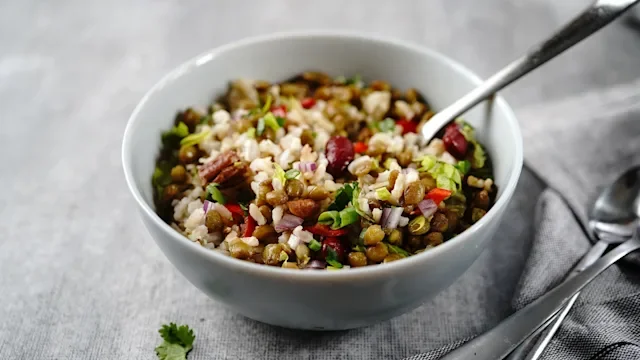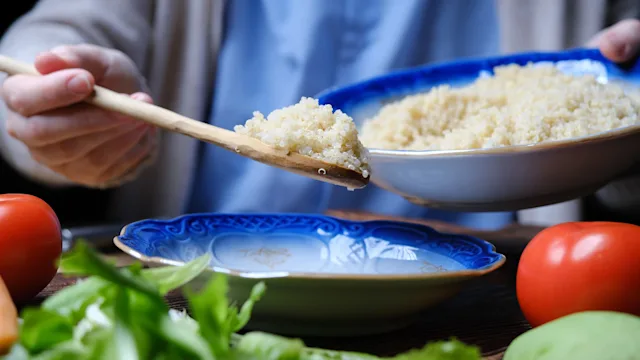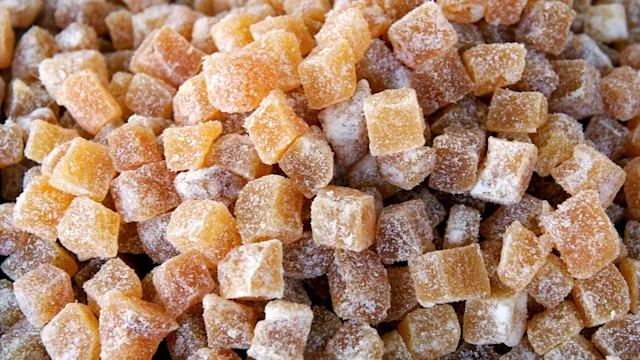Key takeaways:
Drinking coffee may help curb your appetite. But the research is mixed. And coffee may not have the same effect on everyone.
Coffee might make you less hungry by increasing the level of hormones that make you feel full, lowering the hormones that make you hungry, and changing your gut bacteria.
Decaf coffee may also suppress appetite. Some studies suggest that decaf coffee may suppress appetite more than regular coffee does.
Many people think of coffee as their guilty pleasure. People often turn to it for the jolt of energy it can provide. But coffee actually has many health benefits, from boosting mood and concentration to lowering the risk of heart disease.
It turns out coffee may also help with weight management. This is because coffee may make you less hungry. So, does coffee suppress appetite? Below, we’ll review what the science says about the link between coffee and appetite.
Does coffee suppress appetite?
Yes, coffee can curb your appetite. But the research isn’t entirely clear. Most studies show that coffee can suppress appetite. However, some studies show it doesn’t make much of a difference.
These mixed results might be because of differences in how the research studies were set up.
This makes the studies hard to compare. For example, the studies used different types of coffee, tested different amounts, and looked at different timing in relation to meals.
Also, coffee affects everyone differently. It seems to suppress appetite more in people with excess weight compared to those without it.
How does coffee suppress appetite?
Researchers are unsure exactly how coffee suppresses appetite. And they’re still learning about which ingredients in coffee have the biggest effect on appetite.
Coffee may suppress appetite in a few different ways, including:
Increasing hormones that make you feel full, like peptide YY and serotonin
Lowering hormones that make you feel hungry, like ghrelin
Changing the bacteria lining your gut
Helping blood sugar remain stable after eating, which may help prevent sugar cravings
Is coffee good for you? Coffee has many health benefits. One reason is that its antioxidants can help protect you from both short- and long-term health conditions.
Is coffee dehydrating? There's a widely held belief that coffee is dehydrating. But this is a myth, and our experts explain why.
What are the best natural appetite suppressants? When it comes to changing your body weight, there’s not much scientific evidence to support the use of any natural hunger suppressant.
Coffee also contains chlorogenic acids. These are plant-based chemicals that give coffee its flavor and affect hormones related to weight and appetite.
Does caffeine suppress appetite?
Many people assume that coffee affects appetite because of its caffeine. But caffeine by itself doesn’t appear to suppress appetite. In fact, studies have found that caffeine is more likely to increase appetite and sugar cravings.
To add to the confusion, some research suggests that caffeine can help with weight loss and weight maintenance. Caffeine may even help people eat less.
Read more like this
Explore these related articles, suggested for readers like you.
So, it makes sense to assume that caffeine reduces appetite. But even when caffeine is linked to eating less, this doesn’t happen by decreasing your appetite.
Coffee and appetite research
The research on coffee and appetite is mixed. Many studies show that people who drink more coffee are less hungry and eat a little less when they drink coffee. What’s not clear is:
How much coffee you need to drink to suppress appetite
What type of coffee affects appetite
How long the effects may last
Some studies have found that coffee has only a temporary effect on appetite. In one study, people who drank coffee 30 minutes before breakfast ate less at mealtime. But their appetite was unchanged for the rest of the day.
Other research found that drinking coffee led to a lowered appetite for the entire day — but only in people with excess weight. People without excess weight didn’t see any effect on appetite at all.
The truth may be somewhere in the middle. In a review of studies, researchers found that drinking coffee anywhere from 30 minutes to 3 hours before a meal made people less hungry. But this effect on appetite seemed to wear off after 3 to 4 hours.
Will decaf coffee also suppress your appetite?
Yes, decaffeinated coffee can also suppress appetite. One study found that decaffeinated coffee was better than regular coffee at suppressing appetite.
There are two reasons why decaf coffee might curb your hunger better than regular coffee:
Decaf coffee may increase your levels of peptide YY more than regular coffee does. Peptide YY is a hormone that makes you feel full.
And decaf usually contains more chlorogenic acids than regular coffee. Chlorogenic acids are thought to be a main ingredient for how coffee lowers your appetite.
Does drinking coffee help you lose weight?
So, if coffee can suppress appetite, can it help you lose weight? Research suggests that it might. There’s evidence that caffeine can help you burn more calories throughout your day.
People who drink coffee regularly tend to have a lower weight than those who don’t. And people who have lost weight are more likely to maintain their weight loss if they drink coffee regularly. In one study, people who drank 4 cups of coffee per day for 6 months had a decrease of 4% body fat.
But for coffee to help you lose weight, you need to drink it unsweetened. If you add high amounts of sugar or sugary creamer to your daily cup of joe, you’re more likely to gain weight.
Frequently asked questions
It’s not clear exactly how much coffee you need to drink if you want to lower your appetite. It may depend on the type of coffee you’re drinking. But studies have found that even 1 cup of coffee a day is enough to change your appetite.
Decaf coffee may work best for lowering your appetite. One reason is that decaf coffee contains higher levels of chlorogenic acids than regular coffee. These acids work throughout the body to suppress your appetite. But more research is needed to know for sure.
It’s not clear exactly how much coffee you need to drink if you want to lower your appetite. It may depend on the type of coffee you’re drinking. But studies have found that even 1 cup of coffee a day is enough to change your appetite.
Decaf coffee may work best for lowering your appetite. One reason is that decaf coffee contains higher levels of chlorogenic acids than regular coffee. These acids work throughout the body to suppress your appetite. But more research is needed to know for sure.
The bottom line
When it comes to appetite, coffee may not have the same effect on everyone. But there’s evidence that coffee can curb your appetite, especially if you drink it a couple hours before mealtime. While decaf coffee might actually be more effective for some, regular coffee can still do the job. Ultimately, how you feel after drinking coffee is what matters most. If you’re curious about whether coffee could suppress your appetite, it might be worth giving it a try.

Why trust our experts?



References
Bakuradze, T., et al. (2014). Four-week coffee consumption affects energy intake, satiety regulation, body fat, and protects DNA integrity. Food Research International.
Cho, A., et al. (2010). Chlorogenic acid exhibits anti-obesity property and improves lipid metabolism in high-fat diet-induced-obese mice. Food and Chemical Toxicology.
Gavrieli, A., et al. (2011). Caffeinated coffee does not acutely affect energy intake, appetite, or inflammation but prevents serum cortisol concentrations from falling in healthy men. The Journal of Nutrition.
Gavrieli, A., et al. (2012). Effect of different amounts of coffee on dietary intake and appetite of normal-weight and overweight/obese individuals. Obesity.
Greenberg, J. A., et al. (2012). Coffee, hunger, and peptide YY. Journal of the American College of Nutrition.
Harpaz, E., et al. (2016). The effect of caffeine on energy balance. Journal of Basic and Clinical Physiology and Pharmacology.
Harvard T. H. Chan School of Public Health. (2024). Four cups of coffee a day associated with modest loss of body fat.
Henn, M., et al. (2023). Changes in coffee intake, added sugar and long-term weight gain - results from three large prospective US cohort studies. The American Journal of Clinical Nutrition.
Icken, D., et al. (2015). Caffeine intake is related to successful weight loss. European Journal of Clinical Nutrition.
Kale, L. B., et al. (2017). A study on caffeine consumption and its association with stress and appetite among call centre employees in Mumbai city, India. International Journal of Community Medicine and Public Health.
Kilpatrick, A. (2017). Could caffeine be affecting your sugar cravings? Cornell research says yes. The Cornell Daily Sun.
Lee, A., et al. (2019). Coffee intake and obesity: A meta-analysis. Nutrients.
Nguyen, V., et al. (2024). Chlorogenic acid: A systematic review on the biological functions, mechanistic actions, and therapeutic potentials. Nutrients.
Panek-Shirley, L. M., et al. (2018). Caffeine transiently affects food intake at breakfast. Journal of the Academy of Nutrition and Dietetics.
Ramli, N. N., et al. (2021). Effects of caffeinated and decaffeinated coffee consumption on metabolic syndrome parameters: A systematic review and meta-analysis of data from randomised controlled trials. Medicina.
Rosa, F., et al. (2024). Coffee and microbiota: A narrative review. Current Issues in Molecular Biology.
Schubert, M. M., et al. (2014). Coffee for morning hunger pangs. An examination of coffee and caffeine on appetite, gastric emptying, and energy intake. Appetite.
Schubert, M. M., et al. (2017). Caffeine, coffee, and appetite control: A review. International Journal of Food Sciences and Nutrition.
Sweeney, P., et al. (2016). Caffeine increases food intake while reducing anxiety-related behaviors. Appetite.
Tabrizi, R., et al. (2019). The effects of caffeine intake on weight loss: A systematic review and dos-response meta-analysis of randomized controlled trials. Critical Reviews in Food Science and Nutrition.


















